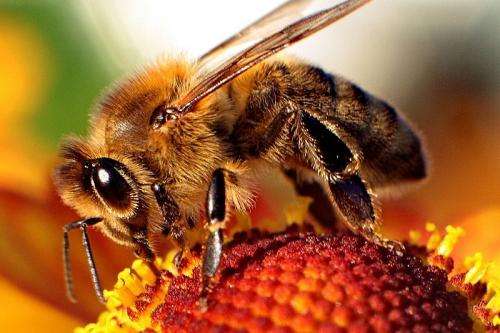Manganese speeds up honey bees

Asked to name one way people have changed the environment, many people would probably say "global warming." But that's really just the start of it.
People burn fossil fuels, but they also mine and manufacture. It's who we are: Homo fabricus: man the maker. And as a side effect of our ingenuity and craft we have taken many metals originally buried safely in Earth's depths and strewn them about the surface.
Does it matter? Yehuda Ben-Shahar and Eirik Søvik, biologists at Washington University in St. Louis, together with colleagues from Andrew Barron's lab at Macquarie University in Australia, have publishd a study of honey bees in the online issue of Biology Letters March 25 that suggests we answer this question too glibly.
The scientists looked at the effect of low levels of manganese, a common industrial pollutant, on the behavior of honey bees. At levels considered safe for human food, the metal seemed to addle bees: they advanced through age-related work assignments faster than normal, yet completed fewer foraging trips than their sisters who were not exposed to manganese.
"We've known for a long time that high doses of manganese kill neurons that produce dopamine, causing a Parkinsonian-like disease in people," said Ben-Shahar. "In insects, as well, high levels of manganese kill dopaminergic neurons, reducing levels of dopamine in the brain.
"But in this study we were looking at low-level exposure and we saw the opposite effect. Instead of reducing dopamine levels, manganese increased them. Increases in dopamine and related neurotransmitters probably explain some of the abnormal behavior, " Ben-Shahar said.
Paradoxically, a trace amount of manganese is essential for life. All living organisms rely on the chemical properties of this metal to drive reactions in cells and to mop up the toxic byproducts of cellular life in the presence of oxygen.
"We evolved in an environment where there was little manganese, and so we developed ways to pump it into our cells," Ben-Shahar said. "But now environmental levels are quite different from those to which we are adapted and we don't really know what that means for human health."
"When we try to understand pathologies, we often look at extremes," he added. "We tend to ignore more modulatory changes like this one and assume we don't need to worry about them. But that may be a mistake. The bees, which vacuum up everything in the environment, might be serving as an early warning indicator of an environmental toxin."
A gene named Malvolio
Ben-Shahar didn't set out to discover the effect of manganese on bee behavior. Instead he was trying to study the link between responsiveness to sugar and the reward circuit in the brain. When a honey bee detects sugar, it reflexively extends its proboscis, a stereotyped behavior that can be experimentally manipulated and quantified.
The older the bee, the more responsive it is to sugar. In honey bee colonies tasks are divided according to age. For the first two to three weeks of adult life, bees typically take care of the brood in the hive. They then shift to foraging outside the hive for the remainder of their 5- to 7-week life.
In 1995 scientists screening for genes that affect sugar response in fruit flies discovered a gene that reduced it. They named it Malvolio, after a sour character in Shakespeare's Twelfth Night who is accused of wanting to outlaw cakes and ale.
Malvolio was later shown to encode a protein that pumps manganese across cell membranes, Ben-Shahar said. In 2004 he published results that showed that age-related transitions in honey bees are associated with increased expression of the Malvolio gene and higher levels of manganese in brain cells.
Ben-Shahar wondered why manganese changed feeding behavior. At high doses it affects a dopaminergic pathway in the brain that is associated with motor control. This is why manganese toxicity causes Parkinsonian-like symptoms, such as tremor and rigidity in humans.
But another dopaminergic pathway reinforces behaviors such as eating or sex. What if low levels of manganese modulated feeding through this pathway, he wondered. Perhaps manganese offered a handle, a tool, to manipulate the reward circuit and to better understand how it works.
Making life rewarding
To make the connection between diet and behavior, he needed to be able to quantify tiny amounts of neurotransmitters (chemicals that transmit signals between neurons) in bee brains. He contacted co-author Andrew Barron of Macquarie University. Eirik Søvik, the first author on the paper, was then a doctoral student in Barron's lab and is now a postdoctoral research associate in Ben-Shahar's lab.
The two labs collaborated to study levels of these molecules in the brains of fruit flies and honey bees fed differing levels of manganese. They also tracked the bees by attaching radio-frequency tags to them when they were a day old (and "still soft, fluffy, and unable to sting you," said Søvik).
In both honey bees and fruit flies, exposure to manganese at levels considered safe for humans increased brain levels of dopamine and octopamine (a neurotransmitter important in insects). At the higher exposures it also altered the behavior of the bees, which became foragers sooner than normal, but made relatively few foraging trips, perhaps because they got lost or tired.
"Manganese is not the number one dangerous thing out there in the environment," Ben-Shahar said. "Nor do we know if it affects our brains the same way it does those of insects. Nobody has done the studies. But even if it has no impact on us, it clearly affects bees, and we depend on bees for most of the fruits and vegetable in our diets."
More information: Negative impact of manganese on honey bee foraging, rsbl.royalsocietypublishing.or … .1098/rsbl.2014.0989
Journal information: Biology Letters
Provided by Washington University in St. Louis




















